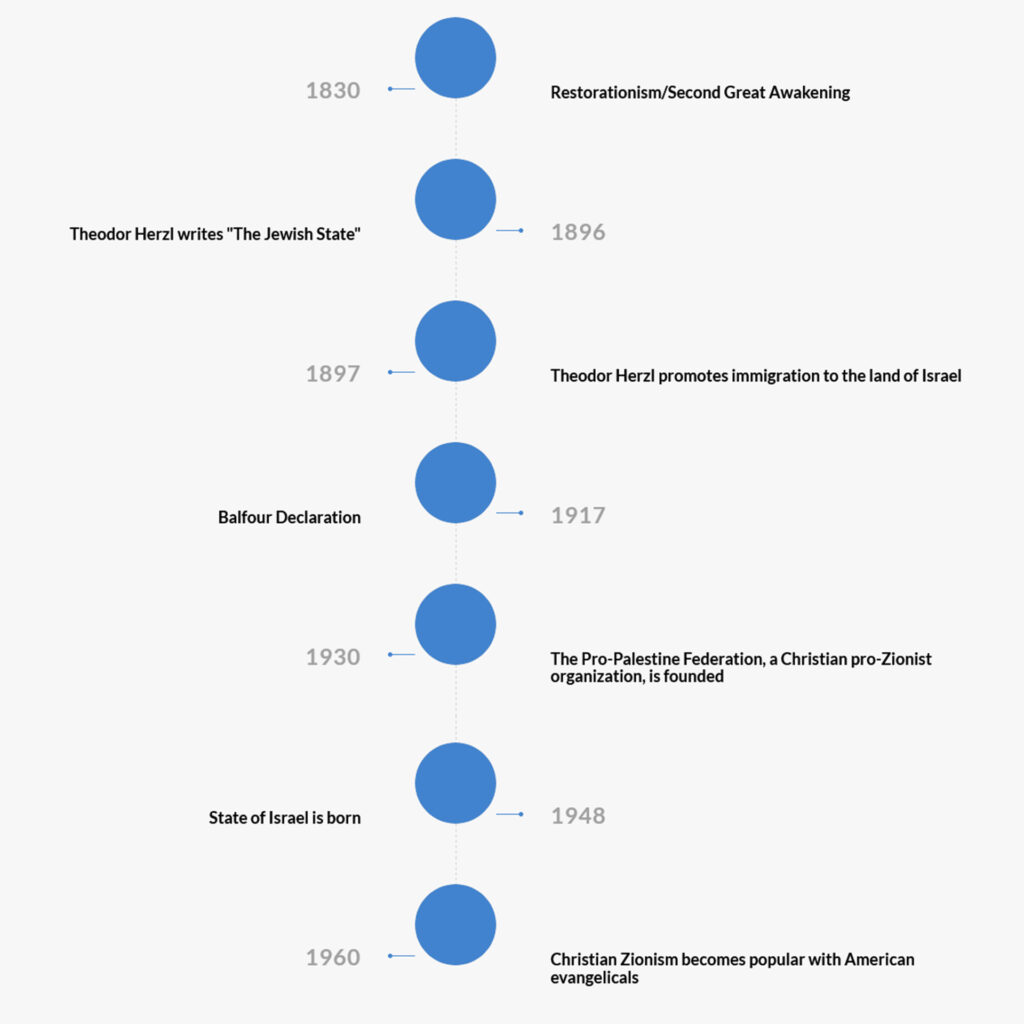A History of Christian Zionism

With the terrorist attacks against the State of Israel on October 7, 2023, and the subsequent shocking manifestation of global antisemitism, it is now more important than ever for the church to have an accurate understanding of God’s plan for Israel.
Although the topic of Israel is a major theme found throughout the Scriptures, it also generates a lot of confusion in the church today. The church has historically fluctuated between two positions when it comes to formulating a theology of Israel and the church. The first is supersessionism, which broadly believes the coming of Jesus spiritually fulfilled the covenantal promises to Israel through the church. This perspective not only removes any distinctive role for Israel as a national entity but also universalizes the specific land promises. As a result, according to proponents of supersessionism, the New Testament redefines the land promises as the whole world. In short, there is neither a specific role for Israel nor any particular land promises for the Jewish nation.
Historically, this viewpoint has resulted in varying levels of anti-Jewish behavior and belief. While supersessionism does not necessarily lead to antisemitism, an analysis of historical antisemitism leads one to agree with theology professor Michael J. Vlach: “It is undeniable that anti-Jewish bias has often gone hand in hand with the supersessionist view1.”
The other main perspective, Christian Zionism, opposes supersessionism. David Schmidt, a scholar of Middle East history, aptly summarizes its basic tenets:
The return of the Jews to the Holy Land and the restoration of a physical Israel is in accordance with biblical prophecy. Furthermore, Christian Zionism is motivated by a biblically based religious conviction that the Jewish people are still God’s Chosen people and are entitled to possess the land of Israel for all time2.
Christian Zionism was confirmed for many Christians in 1948 when the modern State of Israel was reborn in her ancient homeland. However, it would be a mistake to conclude, as many critics do, Israel’s rebirth was the cause of this belief, or Christian Zionism is simply a contemporary political ideology.
There have been Christians waiting for the return of Jewish people to the land of Israel long before 1948, and even before the secular Zionist movement of Theodor Herzl in the late nineteenth century. Herzlian Zionism, as represented in his book The Jewish State (1896), argues for a Jewish return to Zion as the only means to escape antisemitism. Christian Zionism, while similar to its secular counterpart in several ways, is primarily a biblical and theological conviction based upon a particular reading of the Scriptures. Although the term “Christian Zionist” first appeared in the late nineteenth century, those who affirmed a Jewish return to the land and a future role for Israel were referred to as “restorationists” before this time. According to Eugene H. Merrill, an Old Testament scholar, this group “pre-dated modern political Zionism, and when political Zionism arose within the Jewish community in the late nineteenth century, many Christian restorationists gave it their enthusiastic support3.”
Much of the discussion surrounding Zionism today is concerned with the political and legal questions dominating the conversation in the public sphere. However, those who affirm a biblical role for Jewish people base their arguments first upon the Bible, and then usually move to offering valid justifications for Israel’s self-determination today.
The Biblical Roots of Christian Zionism
The beliefs of Christian Zionism are primarily rooted in the covenants and promises God made to Israel. These include the election of Israel as a nation (Deuteronomy 7:6; Psalm 135:4), and the promise of a land for the descendants of Abraham, Isaac, and Jacob (Psalm 105:9–11).
God also promised Israel global blessing through Abraham’s seed (Genesis 12:3), and a future national redemption at the end of the age (Zechariah 12:10). Christian Zionists acknowledge the Bible speaks both of the nation going through times of dispersion from the land and the promise to be regathered back into the land (Ezekiel 36:24–26).
Not believing in the Messiah does not disqualify ethnic Israel from these covenantal promises, as the apostle Paul states, “The gifts and the calling of God are irrevocable” (Romans 11:29). God is faithful to keep His promises to both individuals and nations. The nation in unbelief is still beloved for the sake of the fathers (Rom 11:28). Gentiles who partake of the spiritual blessings of these covenants should earnestly desire and pray for the salvation of Israel (Rom 10:1, 15:27).
These promises find their origin in the covenant with Abraham in Genesis 12:1–3, 15:18, and 17:1–5. The promises include both personal ones to Abraham and national ones to his descendants—who would become a great nation and receive the land of Canaan as an everlasting inheritance. The Abrahamic Covenant has been described as the “central theological rubric of the Old Testament4” because it contains the roots of redemption to come through a land, a nation, and ultimately universal blessing through a person descended from this nation—the Messiah Jesus. These promises are confirmed and amplified by the Davidic Covenant (2 Samuel 7:12–16) and the New Covenant (Jeremiah 31:27–33), as well as numerous statements found in the prophets. The New Testament never rescinds these promises and, contrary to supersessionist claims, neither does it reinterpret them.

Contemporary Christian Zionism
In Britain, Christian Zionism reached its peak in the late nineteenth and early twentieth century. Several factors coincided, leading to Christian Zionists having significant cultural and political influence during this century. These included the rise of Victorian evangelicalism and social activism and the beginnings of Herzl’s political Zionist movement. Many of these Christian Zionists in Britain at this time held title and influence among the political elite of their day. Ultimately, this support would lead to a decisive policy change by the British government in the Balfour Declaration (1917), which committed to providing a national home for Jewish people in Israel.
In the twentieth century, the mantle of Christian Zionism shifted to the United States. Many historians attribute this to the rise of dispensationalism, a view of biblical theology emphasizing the distinction between Israel and the church, and its influence in parts of North America through seminaries and Bible conferences. As dispensationalism spread quickly in the early twentieth century, it served as a unifying force for American evangelicalism. Dispensationalists had a keen interest in eschatological events and a firm belief in the continued election and importance of Israel.
In addition, Christian Zionism has spread rapidly around the world, particularly in South America and South Korea, so much so it has become quite a global phenomenon. With this popularity, there has also arisen a strong stream of Christian anti-Zionist sentiment among those holding to a supersessionist theology. This perspective advocates strongly for the pro-Palestinian narrative and rejects any Christian support of Israel as complicit in alleged Israeli oppression. A recent letter from some Palestinian Christians expressed their “horror” at the “unwavering” support many churches have toward Israel5.
Biblical Christian Zionism should not advocate for anything violating the teaching of the New Testament, which means there is a requirement to show genuine love and concern for the spiritual and physical well-being of Palestinians and all inhabitants of the Middle East. At the same time, Christians should denounce horrific acts of terrorism for what they are—evil.
Believing in the faithfulness of God to keep His promises to Israel does not require supporting every Israeli policy or denigrating Palestinians. Christian Zionists fully affirm God loves Jewish people, Arabs, and all inhabitants of the Middle East, and He sent His beloved Son, Jesus the Messiah, to provide a way for all people to be reconciled to God and to each other. Therefore, Christian Zionists will continue to pray for the peace of Jerusalem and for the gospel to go forth in the Middle East.

Thomas Fretwell is currently undertaking PhD research in a field related to Jewish-Christian studies. He is the founder and ministry director of The Ezra Foundation, which exists to encourage and facilitate the serious study of the Word of God by producing resources promoting a biblical understanding of Israel in the plan of God. Thomas hosts the Theology & Apologetics podcast and serves as the senior pastor at Calvary Chapel Hastings. Please pray for his upcoming tour, March 2–10, 2024, in Los Angeles, CA.
- Michael J. Vlach, Has the Church Replaced Israel?: A Theological Evaluation (Nashville: B&H Academic, 2010), 5. ↩︎
- David W. Schmidt, Partners Together in This Great Enterprise: The Role of Christian Zionism in the Foreign Policies of Britain and America in the 20th Century (Maitland, FL: Xulon Press, 2011), xx. ↩︎
- The Faith and Order Commission, God’s Unfailing Word: Theological and Practical Perspectives on Christian-Jewish Relations (London: Church House Publishing, 2019), 79. ↩︎
- Eugene H. Merrill, “Israel According to the Torah,” in The People, the Land, and the Future of Israel: Israel and the Jewish People in the Plan of God, ed. Darrell L. Bock and Mitch Glaser (Grand Rapids, MI: Kregel Publications, 2014), 34. ↩︎
- Heather Preston, “Palestinian Christians Urge Western Church to Repent of ‘Appalling’ Israeli Support,” Premier Christian News, October 25, 2023, sec. World News, https://premierchristian.news/en/news/article/palestinians-urge-western-christians-to-repent-of-appalling-israeli-support. ↩︎
